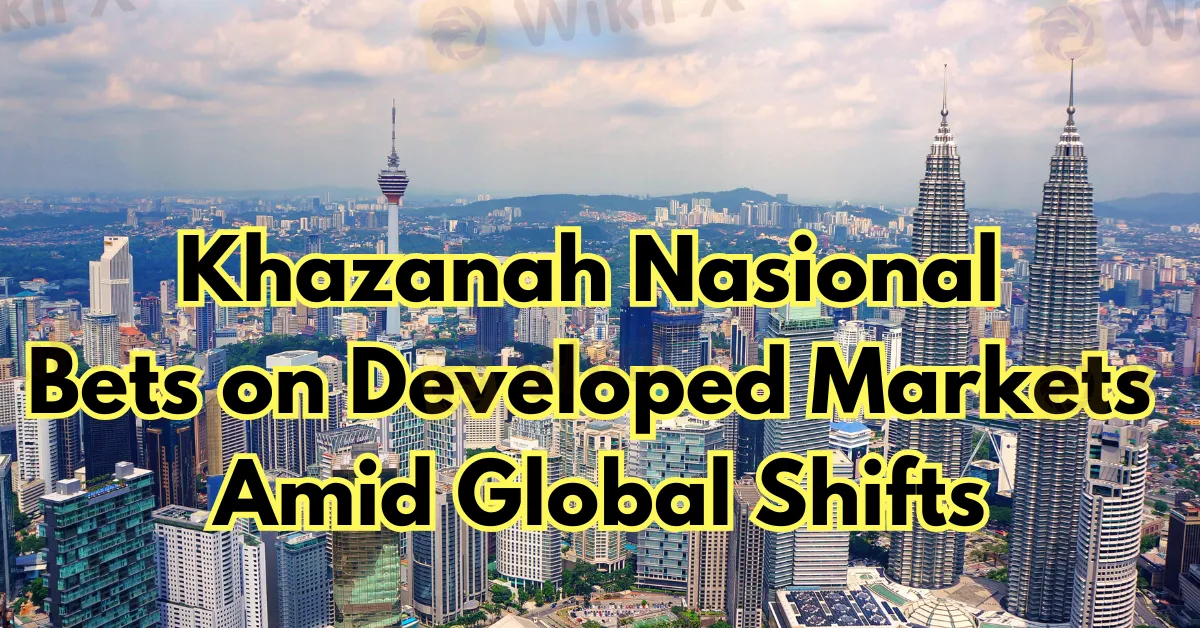简体中文
繁體中文
English
Pусский
日本語
ภาษาไทย
Tiếng Việt
Bahasa Indonesia
Español
हिन्दी
Filippiiniläinen
Français
Deutsch
Português
Türkçe
한국어
العربية
Khazanah Nasional Bets on Developed Markets Amid Global Shifts
Abstract:Khazanah Nasional Bhd, Malaysia's sovereign wealth fund, is shifting its investment focus to developed markets to navigate potential risks arising from global economic changes.

Khazanah Nasional Bhd, Malaysia's sovereign wealth fund, is shifting its investment focus to developed markets to navigate potential risks arising from global economic changes.
Currently, Khazanah's portfolio leans heavily towards domestic investments, which account for 59.1% of its total holdings. The fund's global reach includes North America, contributing 15.5% of its investments, alongside notable allocations in sectors like energy, healthcare, technology, and real estate.
At the World Economic Forum in Davos, Amirul Feisal elaborated on the prospects of expanding investments in developed regions, particularly the United States, Europe, and Japan. He pointed out that the US remains an appealing market due to factors like potential deregulation, lower taxes, affordable energy, inflationary trends, and a strong dollar—all anticipated under the policies of the new administration.
Despite these opportunities, challenges remain, especially in China. The Trump administration's stance on imposing tariffs on Chinese goods raises uncertainties. However, Khazanah plans to maintain its current investments in China, citing the country's growing middle-income population and its thriving technology sector as key factors that ensure its long-term appeal. At present, China represents 8% of Khazanah's portfolio.
India also stands out as a promising market for Khazanah. Amirul Feisal expressed optimism about the returns from both public and private investments in the country. This aligns with the fund's strategy to diversify its portfolio while maximising returns from emerging markets.

Domestically, Khazanah remains optimistic about Malaysias economic outlook. According to Amirul Feisal, the country is experiencing a resurgence of foreign capital inflows, driven by favourable policies, strong domestic consumption, and increasing foreign direct investments. These factors have positioned Malaysia as a stable and attractive market within Southeast Asia.
In 2024, Malaysia gained momentum with significant investments from leading technology firms like Google, Microsoft, and Oracle. These developments contributed to economic growth that exceeded market expectations in the second and third quarters of the year. The Malaysian ringgit emerged as one of Asia's best-performing currencies, further boosting investor confidence.
Amirul Feisal also emphasised Malaysias unique position in the region, noting that foreign investors are rediscovering the market after a period of neglect. This resurgence, coupled with government initiatives to attract both foreign and domestic direct investments, has reinforced the country's standing as a key investment destination.

Disclaimer:
The views in this article only represent the author's personal views, and do not constitute investment advice on this platform. This platform does not guarantee the accuracy, completeness and timeliness of the information in the article, and will not be liable for any loss caused by the use of or reliance on the information in the article.
Read more

AvaTrade Launches Advanced Automated Trading Tools AvaSocial and DupliTrade
AvaTrade launches enhanced automated trading solutions, featuring AvaSocial and DupliTrade for seamless, emotion-free trading. Explore cutting-edge tools today!

Tether Reacts to MiCA Regulations as Crypto.com Delists USDt in Europe
Tether criticizes MiCA-triggered delistings in Europe, warning of market risks. Crypto.com removes USDt and 9 other tokens to comply with EU crypto regulations.

Kraken Brings Back Crypto Staking for U.S. Users as Regulations Ease
Kraken reintroduces crypto staking for U.S. users in 39 states, supporting 17 assets with slashing insurance as regulations ease.

T4Trade Enhances Forex Trading with Advanced Tools for 2025
T4Trade empowers traders with advanced tools like trading calculators, Trading Central features, and an economic calendar for 2025.
WikiFX Broker
Latest News
Fake ‘cyber fraud online complaint’ website Exposed!
Day Trading Guide: Key Considerations
NAGA Launches CryptoX: Zero Fees, 24/7 Crypto Trading
Scam Alert: 7 Brokers You Need to Avoid
AvaTrade Launches Advanced Automated Trading Tools AvaSocial and DupliTrade
What Determines Currency Prices?
Why More Traders Are Turning to Proprietary Firms for Success
MC Markets Review 2025
How to Use an Economic Calendar in Forex Trading
T4Trade Enhances Forex Trading with Advanced Tools for 2025
Currency Calculator






